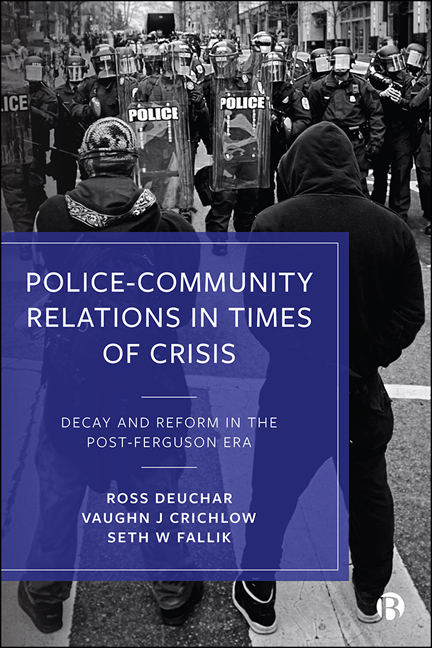1 - Policing, Communities, and the “Legitimacy Crisis”: Context and Empirical Approaches
Published online by Cambridge University Press: 21 December 2021
Summary
In this opening chapter, we set the scene for the book by referencing the contextual backdrop of increased accountability and change in American policing, the challenges around police–community relations, and the political and public concern about gang-related criminality as a related symptom of these issues across the United States (US). We introduce the research methods underpinning the empirical work and conclude by providing an overview of each of the subsequent chapters.
Cops in crisis? Ferguson, police legitimacy, and de-policing
Maybe something in policing has changed. In today's YouTube world, are officers reluctant to get out of their cars and do the work that controls violent crime? … I spoke to officers privately in one big city precinct who described being surrounded by young people with mobile phone cameras held high, taunting them the moment they get out of their cars. They told me, “We feel like we’re under siege and we don't feel much like getting out of our cars” … I do have a strong sense that some part of the explanation is a chill wind blowing through American law enforcement over the last year. And that wind is surely changing behavior. (James B. Comey, Director of the FBI, 2015, cited in Morgan & Pally, 2016, p 7)
The words of James B. Comey are one example of the numerous discussions and debates that have emerged within American law enforcement contexts in recent years. Moreover, Mr. Comey raised several themes emerging in recent discussions on policing, police–community relations, and youth violence that will be introduced in this chapter and explored further in subsequent chapters of this book. It is suggested that police officers are now “under siege,” have become afraid of getting out of their cars, have regularly become the stars of “viral videos,” and that a “chill wind is blowing through American law enforcement.” Another observation that Comey made at the time is that gang-related violence, predominantly among young men who belong to racial minority groups, has continued to escalate within disadvantaged communities.
- Type
- Chapter
- Information
- Police-Community Relations in Times of CrisisDecay and Reform in the Post-Ferguson Era, pp. 3 - 18Publisher: Bristol University PressPrint publication year: 2021



